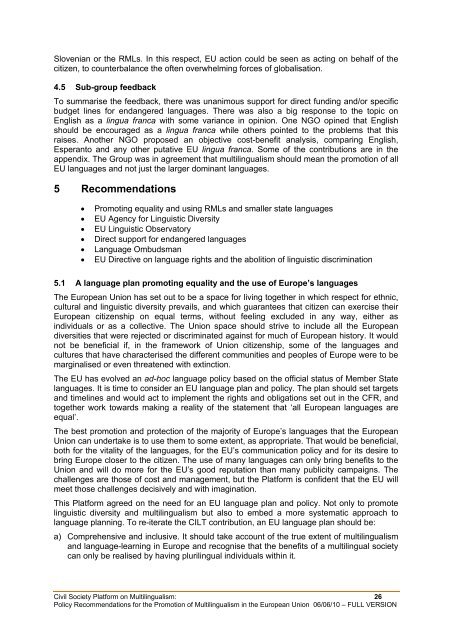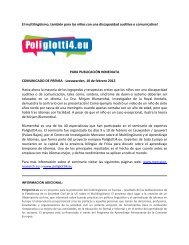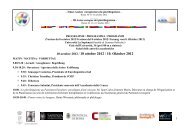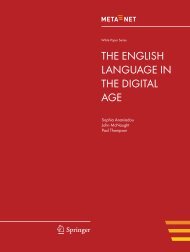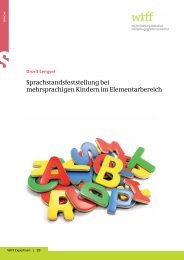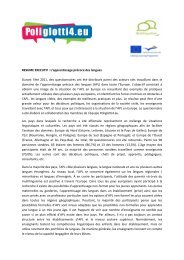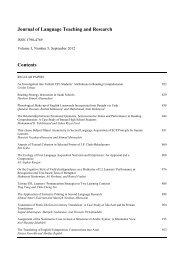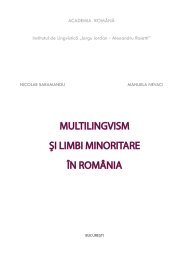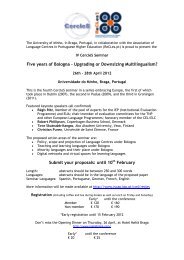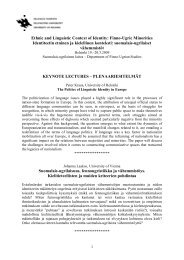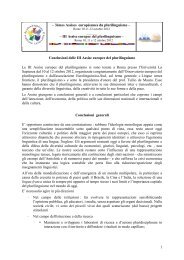Slovenian or the RMLs. In this respect, EU action could be seen as acting on behalf of thecitizen, to counterbalance the often overwhelming forces of globalisation.4.5 Sub-group feedbackTo summarise the feedback, there was unanimous support for direct funding and/or specificbudget lines for endangered languages. There was also a big response to the topic onEnglish as a lingua franca with some variance in opinion. One NGO opined that Englishshould be encouraged as a lingua franca while others pointed to the problems that thisraises. Another NGO proposed an objective cost-benefit analysis, comparing English,Esperanto and any other putative EU lingua franca. Some of the contributions are in theappendix. The Group was in agreement that multilingualism should mean the promotion of allEU languages and not just the larger dominant languages.5 RecommendationsPromoting equality and using RMLs and smaller state languagesEU Agency for Linguistic DiversityEU Linguistic ObservatoryDirect support for endangered languagesLanguage OmbudsmanEU Directive on language rights and the abolition of linguistic discrimination5.1 A language plan promoting equality and the use of Europe’s languagesThe <strong>European</strong> Union has set out to be a space for living together in which respect for ethnic,cultural and linguistic diversity prevails, and which guarantees that citizen can exercise their<strong>European</strong> citizenship on equal terms, without feeling excluded in any way, either asindividuals or as a collective. The Union space should strive to include all the <strong>European</strong>diversities that were rejected or discriminated against for much of <strong>European</strong> history. It wouldnot be beneficial if, in the framework of Union citizenship, some of the languages andcultures that have characterised the different communities and peoples of Europe were to bemarginalised or even threatened with extinction.The EU has evolved an ad-hoc language policy based on the official status of Member Statelanguages. It is time to consider an EU language plan and policy. The plan should set targetsand timelines and would act to implement the rights and obligations set out in the CFR, andtogether work towards making a reality of the statement that ‘all <strong>European</strong> languages areequal’.The best promotion and protection of the majority of Europe’s languages that the <strong>European</strong>Union can undertake is to use them to some extent, as appropriate. That would be beneficial,both for the vitality of the languages, for the EU’s communication policy and for its desire tobring Europe closer to the citizen. The use of many languages can only bring benefits to theUnion and will do more for the EU’s good reputation than many publicity campaigns. Thechallenges are those of cost and management, but the Platform is confident that the EU willmeet those challenges decisively and with imagination.This Platform agreed on the need for an EU language plan and policy. Not only to promotelinguistic diversity and multilingualism but also to embed a more systematic approach tolanguage planning. To re-iterate the CILT contribution, an EU language plan should be:a) Comprehensive and inclusive. It should take account of the true extent of multilingualismand language-learning in Europe and recognise that the benefits of a multilingual societycan only be realised by having plurilingual individuals within it.Civil Society Platform on Multilingualism: 26Policy Recommendations for the Promotion of Multilingualism in the <strong>European</strong> Union 06/06/10 – <strong>FULL</strong> <strong>VERSION</strong>
) Citizen-centred. It should take into account the wishes and needs of citizen in economic,social, educational, cultural and religious spheres as well as the needs of the widersociety.It should link with other policies and objectives (e.g. policies for economiccompetitiveness and social cohesion). It should not be a policy which only interestslinguists or educationalists.c) It should cover all areas of language planning, i.e. (a) status (rules and regulations), (b)corpus (creation of descriptive data, corpuses, tools such as dictionaries, terminologyetc... and (c) acquisition (learning of languages, including L1, L2 and LF).d) Concerning corpus planning the Platform is in favour of a project for the development ofgood quality (electronic) dictionaries from any <strong>European</strong> language to any other. Certainlyif we build on the idea of a personal adoptive languages, it is of utmost importance toguarantee direct access to the vocabulary of these languages for all learners and(foreign) users of that language without a need for a intermediate language, which inmost cases will be English.Such a language plan would be designed to protect and promote all <strong>European</strong> languages.5.2 EU Agency for Linguistic DiversityThe Platform believes in the need to focus on the process of creating good conditions withinwhich the EU can continue to work for the promotion of multilingualism and linguisticdiversity. The following structural measures could help to create favourable conditions:a) Permanent Platform of EU level language NGOs: The <strong>European</strong> Parliament voted atPlenary in 2004 that there should be an Agency for Linguistic Diversity. Many membersof this sub group support that decision. However, the Platform also notes the<strong>Commission</strong>’s subsequent fact-finding mission and recommendation that networks wouldbe way forward. The Platform is of the opinion that a simple network is not adequate, butthat it would be beneficial to create a permanent platform of network organisations(network of networks) as an instrument of dialogue between the <strong>European</strong> policy leveland the local, regional and national language policy level and social reality. In the currenteconomic and political climate, this appears to be a more feasible solution than thecreation of a <strong>European</strong> Agency. Both the <strong>European</strong> institutions and Member States couldsupport improved collaborative work between key actors and stakeholders – includingassociations, regional authorities and NGOs. This may be done through supportingexisting agencies and associations like EBLUL (and its replacement) and EFNIL. Thethree principal EU institutions - the Council, the <strong>European</strong> Parliament and the<strong>Commission</strong> – should work together to develop and implement a working forum forregular strategic review of language learning policies, to ensure better liaison between alllevels involved in the formulation of language policy, and thus help diffuse examples ofbest practice in language learning – see the “Language Education” section of this report.This flexible and “soft” structure/network with some financial support from the <strong>European</strong><strong>Commission</strong> could become the virtual laboratory for the ‘linguistic vision’ and one of itsoutputs could be to produce a feasibility study and business plan to develop andimplement an Agency.b) Legal Basis: the creation of a legal basis that allows the EU to give structural financialsupport to network organisations in the field of language and culture (EUNIC, EBLULsuccessor, EFNIL, EEU etc...) and to interact with them as their interlocutors thatrepresent civil society in the domains of culture and language. These organisationsshould perform preparatory work such as dedicated policy-oriented research, formulationof proposals, dissemination of results and creation of awareness. Given the nature ofthese network organisations they guarantee that all countries and languages be involvedand – through their member organisations – reach the grass roots level.Civil Society Platform on Multilingualism: 27Policy Recommendations for the Promotion of Multilingualism in the <strong>European</strong> Union 06/06/10 – <strong>FULL</strong> <strong>VERSION</strong>


